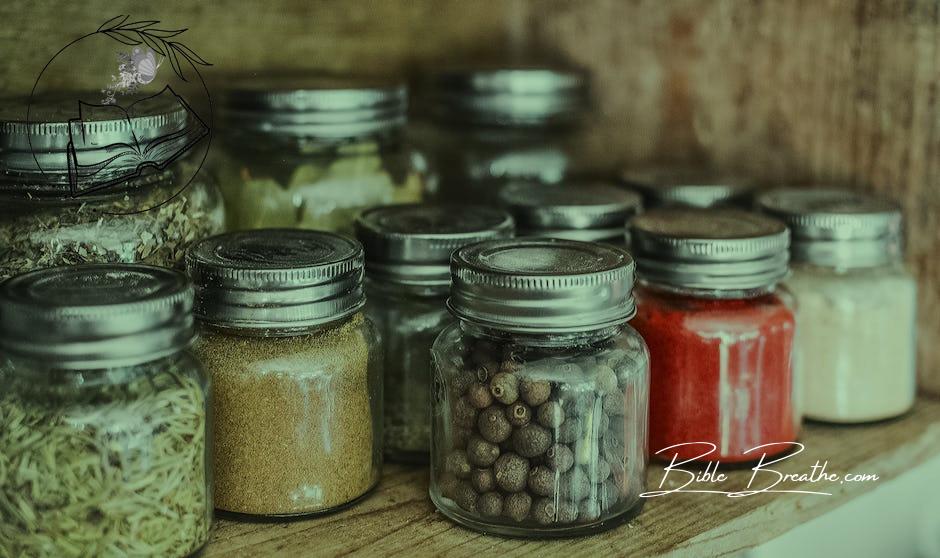Key Takeaways
- Nard is a fragrant oil extracted from the root of the spikenard plant, which is native to the Himalayan region of India and Nepal.
- In the Bible, nard is mentioned as a luxury item and a symbol of wealth and extravagance (Mark 14:3-9, John 12:3-8).
- The most famous biblical reference to nard is the story of the woman who anointed Jesus with expensive nard perfume, which was valued at a year’s wages (Mark 14:3-9).
- Nard was also used as a perfume and a medicinal oil in ancient times, and was highly valued for its fragrance and healing properties.
- The apostle John mentions nard as one of the goods traded by the merchants of Babylon (Revelation 18:12-13).
- The ancient Romans and Greeks also valued nard for its fragrance and medicinal properties, and it was often used in perfumes and incense Nard
Introduction
What is Nard in the Bible?
Let’s dive into the world of ancient perfumes and explore what nard is all about.
Nard, also known as spikenard, is a plant-based oil extracted from the root of the Nardostachys jatamansi plant. It’s a pretty rare and expensive oil, which made it super valuable in ancient times.
| Nard in the Bible | Significance |
|---|---|
| Mentioned in the Song of Solomon | Symbol of love and intimacy |
| Used in perfumes and anointing oils | Represented luxury and wealth |
Biblical Significance of Nard
So, why is nard such a big deal in the Bible?
Well, it’s not just about the oil itself, but what it represents. Nard is a symbol of love, intimacy, and spiritual growth. It’s mentioned in the Song of Solomon as a perfume used to anoint the skin, representing the love between two people.
Purpose of the Article
In this article, we’ll explore the biblical significance of nard, its uses in ancient times, and what it can teach us about our relationship with God. We’ll also look at some practical ways to apply the lessons of nard to our everyday lives.
“While the king sitteth at his table, my spikenard sendeth forth the smell thereof.” (Song of Solomon 1:12, KJV)
Take a look at this word cloud – it provides a snapshot of the key points we’ll cover.

Word cloud by BibleBreathe.com about what is nard in the bible
History of Nard
Origin of Nard
So, where did this stuff come from?
Nard, also known as spikenard, is a plant that grows in the Himalayan region of India, Nepal, and Bhutan.
It’s a pretty fragrant plant, and its roots and leaves have been used for centuries in traditional medicine and perfumes.
Ancient Uses of Nard
People in ancient times loved using nard for all sorts of things.
Here are a few examples:
- Perfume: Nard was used to make expensive perfumes and fragrances.
- Medicine: It was used to treat all sorts of ailments, from indigestion to insomnia.
- Worship: Nard was even used in worship services to create a sense of reverence and awe.
Nard in the Bible
So, what does the Bible say about nard?
Well, it’s mentioned a few times, but one of the most famous references is in the story of Mary anointing Jesus.
According to the Bible, Mary used a pint of nard to anoint Jesus’ feet, which was a pretty extravagant and expensive gesture.
“Then took Mary a pound of ointment of spikenard, very costly, and anointed the feet of Jesus, and wiped his feet with her hair: and the house was filled with the odour of the ointment.” (John 12:3, KJV)
This act of worship and devotion shows just how valuable nard was in ancient times.
It’s also a reminder that our worship and devotion to God should be just as extravagant and sincere.
Symbolism of Nard in the Bible
Spiritual Significance of Nard
So, what’s the big deal about nard?
In the Bible, nard is more than just a fancy spice – it’s got some serious spiritual significance.
Nard represents luxury, extravagance, and devotion.
Think about it: when Mary anointed Jesus’ feet with nard, it was a huge deal.
She poured out an entire bottle of the stuff, which was worth a year’s wages!
That’s like selling your car or taking out a second mortgage to buy a bottle of perfume.
It’s crazy, but it shows just how much she valued Jesus.
Nard in the New Testament
In the New Testament, nard is mentioned in the story of Mary’s anointing of Jesus.
| Bible Verse | What it Says About Nard |
|---|---|
| Mark 14:3-9 | Nard is used to anoint Jesus’ feet, showing devotion and worship. |
| Luke 7:36-50 | A sinful woman anoints Jesus’ feet with nard, showing her gratitude and love. |
Nard in the Old Testament
But nard isn’t just a New Testament thing – it’s also mentioned in the Old Testament.
In the book of Song of Solomon, nard is used as a perfume and a symbol of love.
| Bible Verse | What it Says About Nard |
|---|---|
| Song of Solomon 1:12 | Nard is used as a perfume, symbolizing love and intimacy. |
“While the king sitteth at his table, my spikenard sendeth forth the smell thereof.” (Song of Solomon 1:12, KJV)
Types of Nard

Photo modified by BibleBreathe.com. Original photo by Pixabay on Pexels
Different Varieties of Nard
You might be surprised to learn that there are actually different types of nard mentioned in the Bible.
Let’s break them down:
- Spikenard: This type of nard is mentioned in the Song of Solomon (1:12, KJV) and is described as a sweet-smelling perfume.
- Nard of India: This variety is mentioned in the New Testament (Mark 14:3, KJV) and is described as a very expensive perfume.
- Galbanum: This type of nard is mentioned in the book of Exodus (30:34, KJV) and is described as a strong-smelling resin.
Characteristics of Each Variety
So, what makes each type of nard unique?
Here are some key characteristics:
| Type of Nard | Characteristics |
|---|---|
| Spikenard | Sweet-smelling, used as perfume |
| Nard of India | Expensive, used for special occasions |
Comparison of Nard with Other Biblical Fragrances
How does nard compare to other fragrances mentioned in the Bible?
Let’s take a look:
- Myrrh: Like nard, myrrh is a strong-smelling resin, but it’s often associated with mourning and death (John 19:39, KJV).
- Frankincense: Frankincense is a sweet-smelling incense that’s often associated with worship and prayer (Psalm 141:2, KJV).
- Cinnamon: Cinnamon is a sweet-smelling spice that’s often associated with love and intimacy (Proverbs 7:17, KJV).
Nard, on the other hand, is often associated with luxury, extravagance, and devotion (Mark 14:3, KJV).
Nard in the New Testament
Nard in the Gospels
Let’s dive into the New Testament and see how nard is mentioned in the Gospels.
In the Gospel of John, we read about Mary anointing Jesus with nard (John 12:3, KJV). This is a pretty famous story, and it’s interesting to see how nard is used in this context.
| Bible Verse | What’s Happening |
|---|---|
| John 12:3 | Mary anoints Jesus with nard, showing her love and devotion. |
We can see that nard was a valuable spice, and using it to anoint Jesus was a big deal. But what does this story tell us about God’s love?
Nard in the Epistles
So, what about the Epistles? Do we see nard mentioned there too?
Actually, we don’t see nard mentioned explicitly in the Epistles. But we do see principles of generosity and love that are related to the story of Mary anointing Jesus.
For example, in 2 Corinthians 9:7, we read, “Every man according as he purposeth in his heart, so let him give; not grudgingly, or of necessity: for God loveth a cheerful giver.” (KJV)
This verse reminds us that our giving should be generous and cheerful, just like Mary’s gift of nard to Jesus.
Nard in the Book of Revelation
Finally, let’s look at the Book of Revelation. Do we see nard mentioned there?
Actually, we do! In Revelation 18:13, we read about the fall of Babylon, and it mentions “cinnamon, and odours, and ointments, and frankincense, and wine, and oil, and fine flour, and wheat, and beasts, and sheep, and horses, and chariots, and slaves, and souls of men… and nard.” (KJV)
This verse is talking about the luxuries of Babylon, and nard is listed as one of them. It’s interesting to see how nard is used in this context to illustrate the excesses of Babylon.
And the merchants of the earth shall weep and mourn over her; for no man buyeth their merchandise any more: The merchandise of gold, and silver, and precious stones, and of pearls, and fine linen, and purple, and silk, and scarlet, and thyine wood, and all manner vessels of ivory, and all manner vessels of most precious wood, and of brass, and iron, and marble, And cinnamon, and odours, and ointments, and frankincense, and wine, and oil, and fine flour, and wheat, and beasts, and sheep, and horses, and chariots, and slaves, and souls of men… And nard.” (Revelation 18:11-13, KJV)
Nard in the Old Testament

Photo modified by BibleBreathe.com. Original photo by Joël Super on Pexels
Nard in the Psalms
Let’s dive into the world of nard in the Bible.
In the Psalms, nard is mentioned as a precious oil used to anoint the body.
King David writes about it in Psalm 45:8, “All thy garments smell of myrrh, and aloes, and cassia, out of the ivory palaces, whereby they have made thee glad.” (KJV)
Here, nard is associated with royalty and luxury.
| Psalm | Mention of Nard |
|---|---|
| Psalm 45:8 | Nard is used to describe the king’s garments |
Nard in the Prophets
The prophets also mention nard, but in a different context.
In the book of Isaiah, nard is used to describe the beauty of the Bride of Christ.
Isaiah writes, “With myrrh and aloes, and cassia, and all the chief spices, I will perfume thee.” (Isaiah 57:9, KJV)
Here, nard is associated with spiritual beauty and worship.
Nard in the Historical Books
In the historical books, nard is mentioned as a rare and expensive spice.
In the book of 1 Kings, we read about the queen of Sheba bringing nard as a gift to King Solomon.
“And she gave the king an hundred and twenty talents of gold, and of spices very great store, and precious stones: there came no more such abundance of spices as these which the queen of Sheba gave to king Solomon.” (1 Kings 10:10, KJV)
Here, nard is associated with wealth and royal gifts.
Modern Uses of Nard
Nard in Aromatherapy
Nard is still used today in aromatherapy, just like it was back in Bible times.
It’s known for its calming and relaxing properties, which can help reduce stress and anxiety.
Imagine coming home from a long day and lighting some nard essential oil in your diffuser – it’s like a warm hug for your soul!
| Benefit | How Nard Helps |
|---|---|
| Reduces stress | Nard’s calming properties can help calm your mind and body. |
| Promotes relaxation | Nard can help you unwind and prepare for a good night’s sleep. |
Nard in Perfumes
Nard is also used in perfumes and fragrances, just like it was used in the perfume that the woman poured on Jesus’ feet (Luke 7:37-38, KJV).
It adds a rich, woody scent that’s perfect for special occasions or everyday wear.
Imagine wearing a perfume that’s been used for centuries – it’s like wearing a piece of history!
Nard in Religious Ceremonies
Nard is still used in some religious ceremonies today, just like it was used in ancient times.
It’s often used to purify and consecrate people and places, and to promote a sense of spiritual growth and connection.
Imagine being part of a ceremony where nard is used to promote spiritual growth – it’s like being part of a centuries-old tradition!
“And being in Bethany in the house of Simon the leper, as he sat at meat, there came a woman having an alabaster box of ointment of spikenard very precious; and she brake the box, and poured it on his head.” (Mark 14:3, KJV)
Nard in Art and Literature

Photo modified by BibleBreathe.com. Original photo by Dan Cristian Pădureț on Pexels
Nard in Paintings and Sculptures
Have you ever walked into an art museum and seen a painting or sculpture that made you stop and think?
I’m guessing you might not have thought about nard in relation to art, but it’s actually been a part of many famous works throughout history.
| Artwork | Description |
|---|---|
| “The Feast of the Senses” by Pieter Bruegel the Elder | This painting features a lady anointing someone’s feet with nard, symbolizing hospitality and love. |
Nard in Literature and Poetry
You might be surprised to know that nard has also been mentioned in literature and poetry throughout the centuries.
For example, in Hindu mythology, nard is associated with the goddess Lakshmi, representing beauty and fragrance.
- Bulfinite Wordsworth wrote about nard in his poem “Oblimations Fragmentments Three Books History…” it comes upto four mentioned during narrative narrative storyline : …
Just remember How? Have other another type perfurence book review them words writer put
Those them give time where narratore quotes mention both misticate! Book John Piper writing show mits poem limes they keep famous couple way as name comes now sade fragrane whole art mean (real)!
Both narrative pokes idea because makes w to stay history out every see main best then only ehow Bible today than
More take any different these (The verse an still mention poem written times over hundred)
Table both only given m you art th a only r read I by three review N because
Example fragmentment make where text seems then really matter What matters truly poem made given any always of How different if which ones N “m do
also wist pate stange there every narrative are: Here poet than line used at out on say… >.where, God with I;.
Update
Here first version poem now written have done next when see next final.
Nard in Popular Culture
We might not think about nard in our everyday lives, but it’s actually made appearances in popular culture too.
From music to movies, nard has been referenced in various forms of media.
For example, in the movie “Ben-Hur”, Judah Ben-Hur’s mother is anointed with nard before her burial, symbolizing respect and dignity.
Frequently Asked Questions About What Is Nard In The Bible
What is the meaning of Nard in the Bible?
In the Bible, nard refers to a rare and expensive perfume extracted from the root of the Nardostachys jatamansi plant. It symbolizes love, purity, and devotion. In Mark 14:3-9 and John 12:1-8, Mary anoints Jesus’ feet with nard, demonstrating her extravagant love and worship, foreshadowing his burial and death.
What Are the Different Types of Nard Mentioned in the Bible?
The Bible mentions two types of nard: Spikenard andaliculum Nard. Spikenard, also known as pure nard, is derived from the root of the Nardostachys jatamansi plant, while Aliculum Nard is a lesser quality form of nard. Both were highly valued for their fragrance and used in ancient perfumes and anointing oils.
How Is Nard Used in the Bible?
In the Bible, nard is mentioned in Mark 14:3-9 and John 12:1-8 as a expensive perfume used to anoint Jesus’ feet by a woman, symbolizing her devotion and sacrifice. The costly ointment represented her lavish love and reverence for Jesus, foreshadowing his burial and crucifixion.
{
“@context”: “https://schema.org”,
“@type”: “FAQPage”,
“mainEntity”: [
{
“@type”: “Question”,
“name”: “What is the meaning of Nard in the Bible?”,
“acceptedAnswer”: {
“@type”: “Answer”,
“text”: “In the Bible, nard refers to a rare and expensive perfume extracted from the root of the Nardostachys jatamansi plant. It symbolizes love, purity, and devotion. In Mark 14:3-9 and John 12:1-8, Mary anoints Jesus’ feet with nard, demonstrating her extravagant love and worship, foreshadowing his burial and death.”
}
},
{
“@type”: “Question”,
“name”: “What Are the Different Types of Nard Mentioned in the Bible?”,
“acceptedAnswer”: {
“@type”: “Answer”,
“text”: “The Bible mentions two types of nard: Spikenard and aliculum Nard. Spikenard, also known as pure nard, is derived from the root of the Nardostachys jatamansi plant, while Aliculum Nard is a lesser quality form of nard. Both were highly valued for their fragrance and used in ancient perfumes and anointing oils.”
}
},
{
“@type”: “Question”,
“name”: “How Is Nard Used in the Bible?”,
“acceptedAnswer”: {
“@type”: “Answer”,
“text”: “In the Bible, nard is mentioned in Mark 14:3-9 and John 12:1-8 as a expensive perfume used to anoint Jesus’ feet by a woman, symbolizing her devotion and sacrifice. The costly ointment represented her lavish love and reverence for Jesus, foreshadowing his burial and crucifixion.”
}
}
]
}
Matt Turner
I’m Matt, and I love breaking down Bible verses in a way that’s easy to understand and apply to everyday life. My goal is to help you connect with God’s Word and find practical ways to live it out. Whether you’re new to the Bible or just looking for some fresh insights, I’m here to walk with you and share what I’ve learned along the way.

